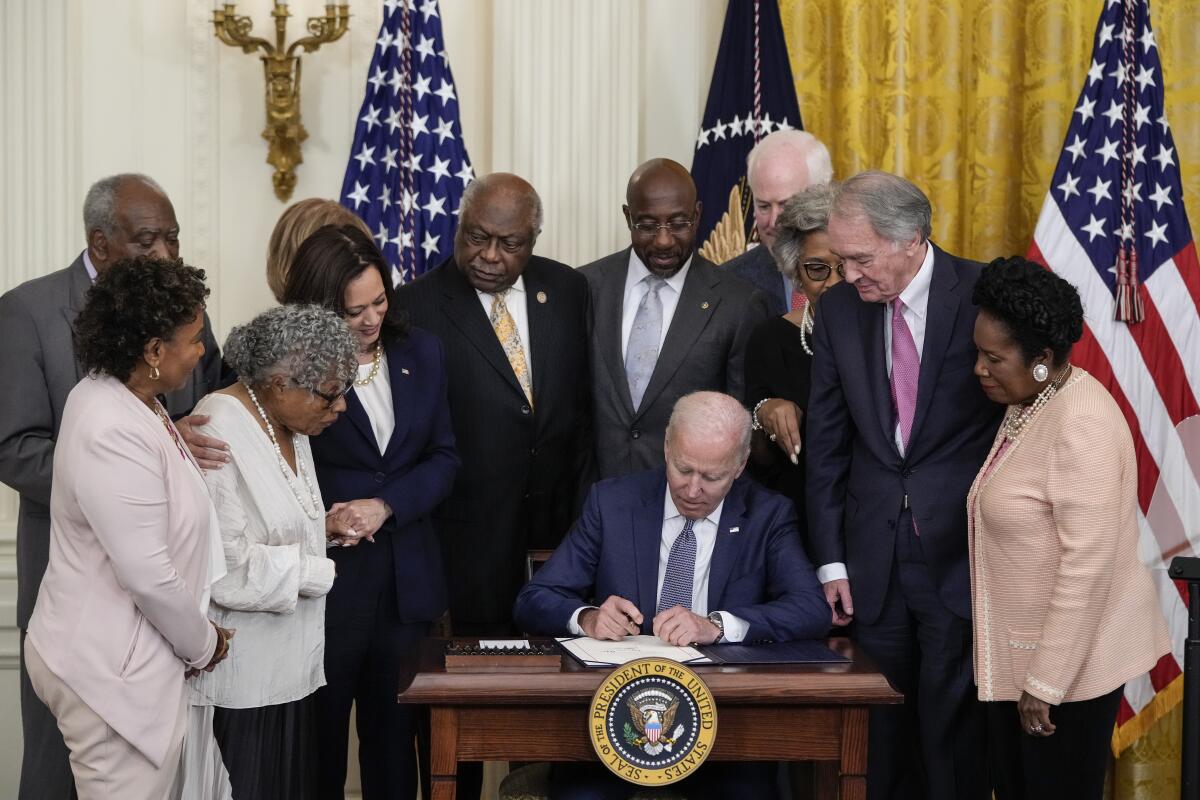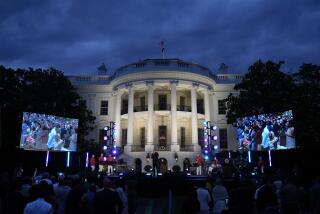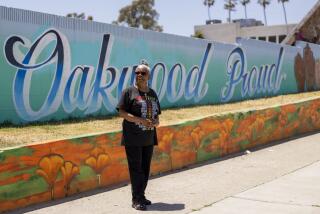The legacy of slavery made Juneteenth hard for me to celebrate

- Share via
My friends and family have been giddy with glee since Juneteenth was declared a national holiday last week. For them, that registers as a dual victory: a day off work, free of overseers; and a tribute to those who fought, suffered and died for our freedom.
I didn’t want to step on anyone’s joy as they celebrated the new holiday. But now that the day has passed, I’m wondering if there are others like me who just couldn’t feel very celebratory.
It’s not that I have trouble imagining the joy my forebears felt, as news of the end of slavery spread. Juneteenth celebrates the day — June 19, 1865 — that word finally reached Texas that the Civil War had ended and Black people were no longer human chattel.
I believe it’s important that we validate that turning point in our nation’s history — and I like a day off work as much as anybody.
Still, I’m bothered by the notion of a holiday that requires me to be grateful that my ancestors were freed to live as human beings, but only after centuries of being tortured, brutalized, separated from their families and bought and sold as property.
I can’t celebrate the end of slavery every year without also being reminded of the reign of terror it unleashed. And that skunks up the party for me.
For decades after emancipation, Juneteenth jubilees were haunted by the vestiges of slavery. Lynchings of Black people continued unabated — and were publicly celebrated by white crowds who showed up with picnic baskets and children in tow.
If, as a nation, we are going to celebrate the official end of slavery, we need also to acknowledge its lasting impact: the ways the dreadful practice shaped our institutions, shackled generations of Black Americans and subsidized our investment in white supremacy.
Without that kind of come-to-Jesus moment, this national holiday feels half-empty to me. After all, it’s been 156 years since Texas first celebrated Juneteenth and we’re still trying to sell America on the idea of Black lives mattering.
Just this spring, a group of north Texas high school students thought it was funny to “auction” off their Black classmates in a social media “Slave Trade” group, replete with caustic racial slurs. They were disciplined by school officials, but parents defended their race-mongering as harmless tomfoolery.
Stories like this — and they’re emerging in every region of the country — make clear that our education system is failing to convey the true dimensions of centuries spent enslaving human beings.
A survey by the Southern Poverty Law Center four years ago found that only 8% of high school seniors knew that slavery was the central issue in the Civil War.
There’s a tendency for textbooks and teachers to shrink or sanitize a subject that stains our nation’s legacy. That may shield students from the true horror of the institution. But it also deprives them of the opportunity to explore both the brutality of oppression and the bravery of endurance.
Teachers say, correctly, that the subject is hard to teach. They don’t want Black students to feel sad or singled out, or white students to feel guilty or defensive, the survey found. Some teachers worry that focusing on slavery’s influence might feed a narrative of white supremacy among young people.
“Just the fact that it was a widely accepted practice in our nation seems to give the concept of [Black] inferiority more weight in some students’ eyes,” one California teacher told pollsters.
But if we’re not willing to tackle those perceptions straight on, we’ll be allowing a whitewashed version of history to obscure the challenges we still face today.
I know that living with the legacy of slavery can be an emotionally complicated thing. It bewildered me as a child, and I’ve been dealing with it anew since the Juneteenth back-slapping began.
I keep thinking back to my vacation in Costa Rica more than a decade ago. I stayed on the Caribbean coast in Limon, a community of English-speaking Black people whose ancestors migrated there, mostly from Jamaica, to work on coffee and banana plantations in the early and mid-1800s.
Virtually every Afro-Costa Rican person I spoke with mentioned at some point in our conversation, with clear and considerable pride, “We were never slaves!”
They’d unfurl their history as free people, as if that conveyed something noble about them — and deficient in me.
Their declarations put me in touch with my own reservoir of anger — and vague sense of shame — associated with a lineage linked to slavery. I wondered if that sordid chapter in our country’s history had left some sort of indelible taint on me.
Now I’m wrestling with that sort of existential question again as I ponder how best to celebrate this new holiday in a rich nation built in part on the unpaid labor of slaves, yet reluctant to take the blinders off and look squarely at what that legacy has wrought.
I imagine swaths of white America laughing behind its collective sleeve at how easily we can be appeased. Just give them a holiday.
So along with a day of vacation, how about America gives us something enduring to celebrate: Protect voting rights, provide reparations, keep cops from killing unarmed Black people, prepare new generations to challenge prejudice — and stop pretending that the end of slavery somehow leveled the playing field.
More to Read
A cure for the common opinion
Get thought-provoking perspectives with our weekly newsletter.
You may occasionally receive promotional content from the Los Angeles Times.










